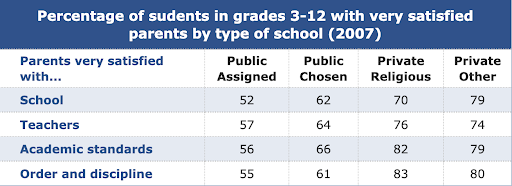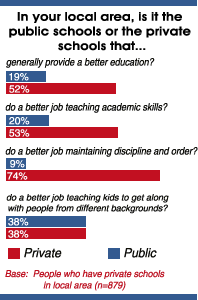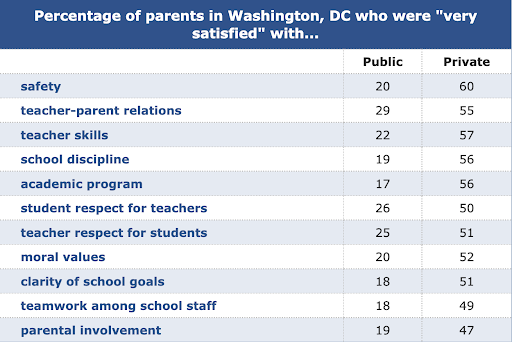More Satisfied Parents
Private education benefits families by offering a wide range of educational options, including schools rooted in religious traditions, schools that provide intensive academic experiences, and schools that are specialized for specific populations. School choice, which should be every family’s right, enables parents to select an educational setting based on the needs of their children and their sense of what a school should be.
Parents of children in private schools are more satisfied with their schools than parents of children in public schools. Trends in the Use of School Choice: 1993 to 2007 , a report released in April 2010 by the National Center for Education Statistics shows that 70 percent or more of private school parents in 2007 were “very satisfied” with the schools their children attended, as well as with the teachers, academic standards, and discipline in those schools.

High Marks from Parents
Parents and students generally give high marks to private schools. Public Agenda, a national research organization, released a report in November 1999 entitled On Thin Ice, which found that people who have private schools in their communities believe by wide margins that such schools “generally provide a better education” than public schools and do a better job “teaching academic skills” and “maintaining discipline and order.”

Most studies of school choice for low-income families find that parents whose children attend private schools are much more satisfied with various elements of school life than parents of students in public schools. To illustrate this point, the following table compares the attitudes of two sets of low-income parents who applied for privately funded scholarships in Washington, DC: those whose children received the scholarships (as a result of a lottery drawing) and those whose children did not. The table reflects data in a 2000 report from Harvard University entitled School Choice in Washington, DC: An Evaluation After One Year.

More Satisfied Teachers
Private school teachers are more satisfied than their public school counterparts with careers, classroom conditions, and school climate, according to a groundbreaking report released today by the Friedman Foundation for Educational Choice.
The report, titled Free to Teach: What America’s Teachers Say About Teaching in Public and Private Schools, draws on data from the Schools and Staffing Survey conducted by the National Center for Education Statistics at the U.S. Department of Education.
“These are eye-opening data on how America’s public and private school teachers view their work and their schools,” said Greg Forster, one of the authors of the study.
“The results here highlight the professional differences felt by teachers from public and private schools,” said Christian D’Andrea, the study’s co-author. “While public school teachers are faced with more hassles inside and outside the classroom, private school teachers have much more freedom to teach. These private school teachers report having better working environments and stronger networks of staff support.”
According to the report’s executive summary…
- Private school teachers are much more likely to say they will continue teaching as long as they are able (62 percent v. 44 percent), while public school teachers are much more likely to say they’ll leave teaching as soon as they are eligible for retirement (33 percent v. 12 percent) and that they would immediately leave teaching if a higher paying job were available (20 percent v. 12 percent).
- Private school teachers are much more likely to have a great deal of control over selection of textbooks and instructional materials (53 percent v. 32 percent) and content, topics, and skills to be taught (60 percent v. 36 percent).
- Private school teachers are much more likely to have a great deal of influence on performance standards for students (40 percent v. 18 percent), curriculum (47 percent v. 22 percent), and discipline policy (25 percent v. 13 percent).
- Public school teachers are much more likely to report that student misbehavior (37 percent v. 21 percent) or tardiness and class cutting (33 percent v. 17 percent) disrupt their classes, and are four times more likely to say student violence is a problem on at least a monthly basis (48 percent v. 12 percent).
- Private school teachers are much more likely to strongly agree that they have all the textbooks and supplies they need (67 percent v. 41 percent).
- Public school teachers are twice as likely as private school teachers to agree that the stress and disappointments they experience at their schools are so great that teaching there isn’t really worth it (13 percent v. 6 percent).
- Public school teachers are almost twice as likely to agree that they sometimes feel it is a waste of time to try to do their best as a teacher (17 percent v. 9 percent).
- Nearly one in five public school teachers has been physically threatened by a student, compared to only one in twenty private school teachers (18 percent v. 5 percent).
- Nearly one in ten public school teachers has been physically attacked by a student, three times the rate in private schools (9 percent v. 3 percent).
“Documenting existing teacher working conditions is a first step in helping the nation’s educational system – both private and public schools – improve working conditions and the overall profession,” said Robert Enlow, President and CEO of the Friedman Foundation.
Morale Higher Among Private School Teachers
What motivates a person to become a teacher? A study released in May 2000 by Public Agenda examines that question, and the answers are surprising.
Higher salaries, which many policymakers now regard as the magic bullet for the looming teacher shortage, may not be what teachers want most, according to the report. “They want to work in schools with involved parents, well-behaved students, smaller classes and supportive administrators, and most would even pass up significantly higher salaries in favor or working conditions that offer these.”
Private school teachers reported higher levels of morale than public school teachers, a greater sense of being respected and appreciated, and less likelihood to “face a lot of frustration in their work.” By a greater than two-to-one margin (54 percent to 20 percent) private school teachers were more likely than their counterparts in public schools to agree strongly with the statement “At my school teachers can count on the support of parents.”
The report is based on a series of focus-group sessions and national telephone surveys, including one of 664 public school teachers and 250 private school teachers with five or fewer years of experience.

The full report, which is entitled A Sense of Calling: Who Teaches and Why, is available on the Public Agenda Web Site.

